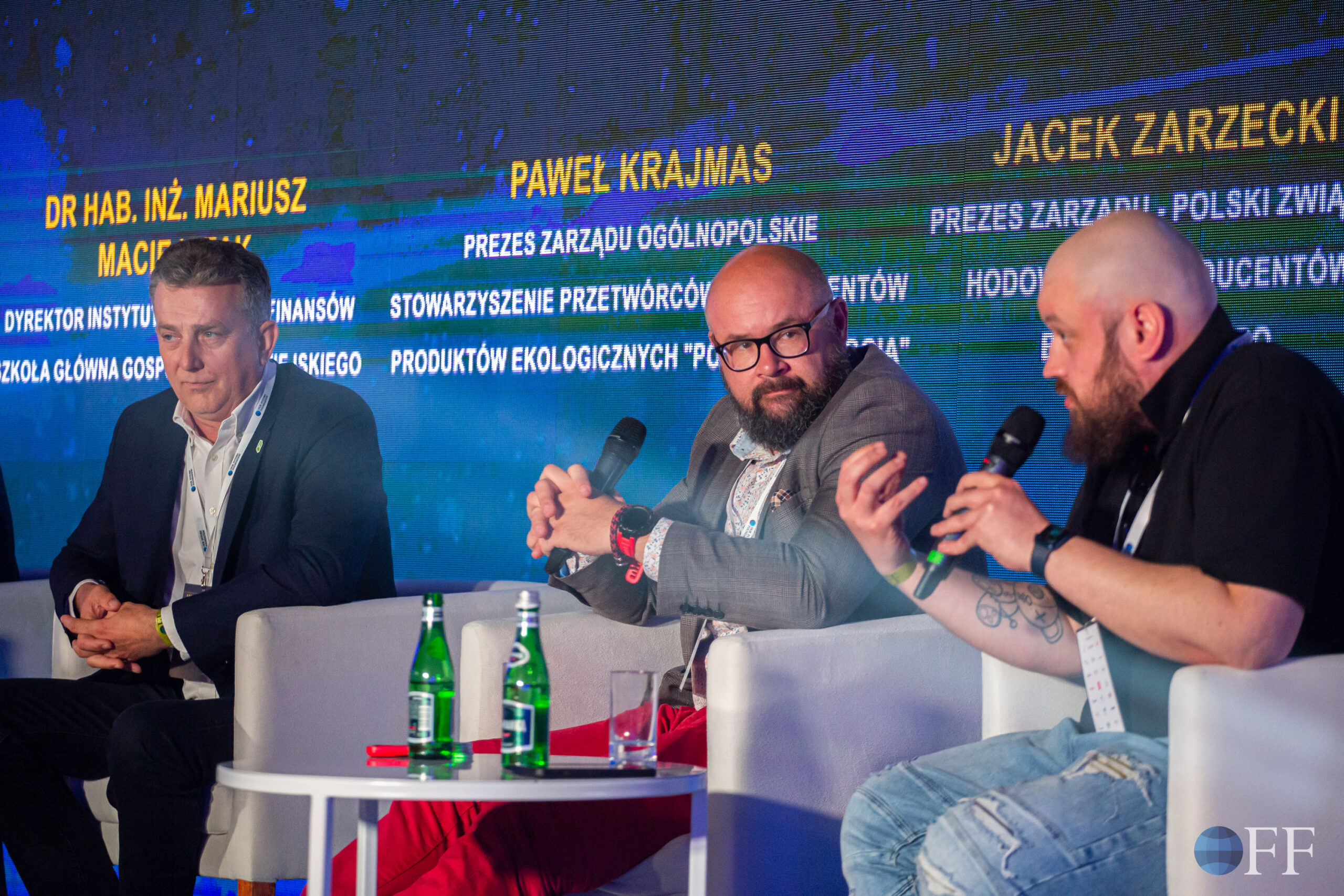On May 12, at the The Tides conference center in Warsaw, the 5th edition of Our Future Forum took place, bringing together young participants from all over Poland. One of the ten discussion panels concerned organic food. The participants were asked the question – is it worth it?
The panel was moderated by Dawid Daniel Malinowski – member of the board of the OFF foundation. The panel was attended by: Michał Fedorowicz – President of the Institute for Internet and Social Media Research, Jan Golba – Deputy Director of the Department of Organic Agriculture and Food Quality at the Ministry of Agriculture and Rural Development, Paweł Krajmas – President – National Association of Processors and Producers of Organic Products “Polska Ekologia”, dDr hab. Eng. Mariusz Maciejczak, prof. SGGW – Rector’s Plenipotentiary for Education Quality – Warsaw University of Life Sciences and Jacek Zarzecki – President of the Polish Association of Beef Cattle Breeders and Producers.
The first question concerned the importance of organic farming in Poland. Jan Golba replied that organic farming is a key area not only for Poland, but also for the entire European Union.
Paweł Krajmas added that in his opinion organic farming is a balance between people, animals and plants. “We must respect food and maintain a green balance,” he said. He stated that from the farmer’s perspective, organic farming is more than just farming, it is also a way of life.
Mariusz Maciejczak thanked the young people for their interest in such an important topic, and then pointed out that man coexisted in harmony with nature throughout almost his entire history until the 18th century, i.e. until the industrial revolution. He stressed that today it is necessary to return to food production in an ecological way, so as not to pollute our planet. “Organic food can be beneficial not only from the producer’s perspective, but also from the consumer’s,” he concluded.
Next, Dawid Daniel Malinowski asked how organic food could be promoted. The gauntlet was taken up by Paweł Krajmas, who said that the way young people perceive the world differs from the vision of the world of representatives of his generation. He decided that the key problem was to reach generation Z with the right message to encourage them to buy organic food. He said that he is against shopping online, because when ordering parcels from often very distant places, we generate a carbon footprint in the form of greenhouse gas emissions by the courier who delivers the parcel.
Jan Golba pointed out that profit maximization cannot be the only motivation to produce organic food. He went on to say that the best way to increase environmental awareness is to introduce extra classes on the subject in schools at the primary education level.
Paweł Krajmas admitted that we should focus on developing economic patriotism among young people and encourage them to buy Polish beets, not Mexican avocados.
Mariusz Maciejczak used an analogy, comparing a chair with three legs to the production of organic food, which is not aimed at maximizing profit. He emphasized that just like a chair with three legs wobbles and does not maintain a stable position, the production of organic food without the desire to maximize profit does not ensure full efficiency.
Jacek Zarzecki asked how many conference participants buy products marked with a green leaf. Only a small number of people in the room raised their hands. The president of the Polish Association of Beef Cattle Breeders and Producers summed up this short survey with a clear observation that organic food will never replace conventional food. After a while, however, he pointed out that conventional food does not have to be worse than organic food. Then he shared with young people the fact that he has been an organic farmer himself since 2006, but stipulated that he treats this profession only in business terms. “There are no sentiments in agriculture. If things don’t work out for you for ten years, you won’t add to the deal, because what kind of deal is that? Agriculture is a branch of the economy just like any other. If it doesn’t work, you do something else.” he said. He also mentioned the ambitious goals set by the European Union, which assume a twenty-five percent share of organic food in the production of all food.
Source: Our Future Foundation Report
Photo: Our Future Foundation
Maksymilian Mirecki


